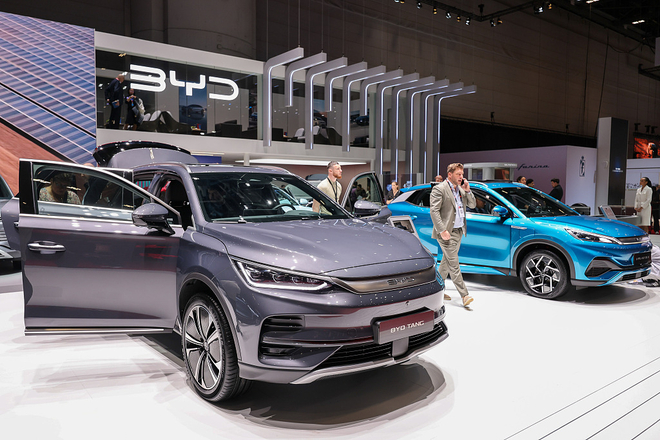EU Imposes Provisional Tariffs on Chinese-Made Electric Vehicles, SAIC Group Faces Highest Rate (AI Translation)
Listen to the full version


文|财新 安丽敏
By Caixin An Limin
【财新网】欧盟计划从7月4日起对中国产纯电动汽车加征临时反补贴关税。6月12日,欧盟委员会宣布上述消息。
[Caixin Net] The EU plans to impose provisional countervailing duties on pure electric vehicles from China starting July 4. This announcement was made by the European Commission on June 12.
在公布政策之前,欧盟对三家中国企业开展了历时数月的抽样调查。其中,上汽集团(600104.SH)面临加征关税税率达38.1%,税率最高;吉利汽车(00175.HK)和比亚迪(002594.SZ)面临加征税率分别为20%和17.4%。
Prior to announcing the policy, the European Union conducted a months-long sampling investigation on three Chinese companies. SAIC Motor Corporation Limited (600104.SH) faces the highest additional tariff rate at 38.1%, while Geely Automobile Holdings Limited (00175.HK) and BYD Company Limited (002594.SZ) face additional tariff rates of 20% and 17.4%, respectively.
欧委会还宣布,对其他未被抽样但配合调查的企业,统一按照加权平均税率21%加征关税;针对不配合调查企业,加征税率为38.1%。
The European Commission also announced that for companies that were not sampled but cooperated with the investigation, a unified weighted average tariff of 21% would be imposed; for companies that did not cooperate with the investigation, a tariff rate of 38.1% would be imposed.

- DIGEST HUB
- The EU plans to impose provisional countervailing duties on Chinese electric vehicles starting July 4, with SAIC Motor facing the highest tariff at 38.1%, and Geely and BYD facing 20% and 17.4%, respectively.
- These tariffs come after a months-long investigation into alleged subsidies, resulting in increased tariffs for various Chinese companies, potentially impacting their exports.
- China's Ministry of Commerce strongly opposes the measures, warning of retaliation and emphasizing the potential disruption to the global automotive supply chain.
The European Union (EU) plans to impose provisional countervailing duties on pure electric vehicles (EVs) imported from China starting July 4, a move announced by the European Commission on June 12 [para. 1]. The EU conducted a months-long investigation on three Chinese companies: SAIC Motor, Geely Automobile, and BYD Company, subjecting them to additional tariff rates of 38.1%, 20%, and 17.4%, respectively [para. 2][para. 3]. For other cooperating companies, a unified weighted average tariff of 21% will be imposed, while non-cooperating firms face a 38.1% tariff [para. 3]. If no agreement is reached with the Chinese government, these tariffs will be implemented as scheduled [para. 4].
Currently, the EU’s regular tariff rate for passenger cars is 10%, meaning non-cooperating companies like SAIC could face an increased rate of 48.1% [para. 5]. The European Commission is also taking into account multinational enterprises like BMW, Tesla, and Renault, which may be subject to individually calculated tariffs [para. 6]. An anonymous industry insider pointed out that SAIC’s high tariff suggests non-cooperation with the EU investigation, possibly due to sensitivity around commercial secrets [para. 7]. In 2023, SAIC Motor exported 243,000 vehicles to Europe [para. 8].
SAIC Motor issued a statement on June 13 claiming it relies on technological innovation and is in the process of building a factory in Europe [para. 9][para. 10]. In contrast, China’s Ministry of Commerce criticized the EU for ignoring World Trade Organization rules and expressed strong dissatisfaction [para. 11][para. 12].
The European Commission initiated an anti-subsidy investigation into Chinese electric vehicles in October 2023, which could formally conclude within 13 months [para. 13]. The EU argues that Chinese EVs benefit from government subsidies, leading to market disruptions in Europe [para. 14]. Within the investigation window, the EU has the authority to impose preliminary relief measures, including temporary tariffs [para. 14]. According to a senior engineer, Liu Yan, from the China Automotive Strategy and Policy Research Center, true trade figures suggest that the EU still holds a trade surplus with China in the automotive sector [para. 16].
The implementation of additional temporary tariffs is expected to significantly impact Chinese EV exports to Europe [para. 18]. Projections indicate a potential 30% decrease in export volumes if the 21% tariff is enacted [para. 19]. A German research institute estimated that a 20% countervailing duty could decrease Chinese EV exports to Europe by approximately 125,000 units annually [para. 21]. This scenario would favor local EU car manufacturers but potentially increase consumer prices [para. 22].
Key players in the industry, including BMW Chairman Oliver Zipse, have voiced opposition to these tariffs, arguing they could stifle competition and adversely affect Europe’s automotive industry [para. 25][para. 26]. China has hinted at possible retaliatory measures, although specific actions remain undetermined [para. 28]. Chinese officials, like the Minister of Commerce Wang Wentao, have engaged in diplomatic efforts to prevent the matter from escalating into a trade war [para. 31].
Despite the challenges, Chinese automakers are pursuing local production strategies in Europe, evidenced by BYD's factory in Hungary and Chery’s joint venture in Spain [para. 32]. Establishing local factories aims to mitigate the impact of tariffs and support long-term growth in the European market [para. 34][para. 35]. However, companies like Chery will need time to adapt to local labor laws and higher production costs in Europe [para. 37][para. 38].
Overall, while the EU’s proposed tariffs could hinder Chinese EV exports, Chinese automakers are exploring local production to maintain their presence in the European market [para. 39][para. 40]. Despite the tension, the automotive trade between China and the EU continues to evolve, with both sides cautiously navigating economic and trade policies [para. 42].
- SAIC Motor Corporation Limited
- SAIC Motor Corporation Limited (600104.SH) faces a 38.1% temporary anti-subsidy tariff from the EU starting July 4. This tariff matches the rate for non-cooperating companies, suggesting SAIC didn't fully comply with EU's investigation. Despite this, SAIC emphasizes their reliance on technological innovation over subsidies and plans to build a factory in Europe. In 2023, SAIC exported nearly 243,000 vehicles to Europe.
- Geely Automobile Holdings Limited
- Geely Automobile Holdings Limited (00175.HK) faces a 20% temporary anti-subsidy tariff from the EU on electric vehicles starting July 4. This follows a months-long investigation by the European Commission into Chinese EV manufacturers.
- BYD Company Limited
- BYD Company Limited, facing a provisional countervailing duty of 17.4% from July 4, 2023, plans to continue its long-term development in Europe by building a factory in Hungary. This step is part of its strategy to bypass EU tariffs and enhance local production.
- Tesla, Inc.
- Tesla, Inc. is listed among the cooperating companies with the EU's anti-subsidy investigation on Chinese electric vehicles. Tesla has applied for a potentially individualized tariff rate during the final phase of the investigation. Tesla China is also a significant exporter of electric vehicles to Europe.
- BMW Group
- BMW Group's chairman, Oliver Zipse, criticized the EU's additional tariffs on Chinese electric vehicles as a wrong decision, arguing it would hinder European carmakers and harm European interests. He emphasized that protectionist measures like higher import tariffs won't enhance global competitiveness and reiterated BMW's strong support for free trade.
- Renault Group
- Renault Group is mentioned as one of the multinational companies producing electric vehicles in China for export to Europe. Specifically, Renault is listed among other firms like BMW and Tesla that are collaborating with Chinese manufacturers and could be affected by the EU's proposed anti-subsidy tariffs on Chinese-made electric vehicles.
- Chery Automobile Co., Ltd.
- Chery Automobile Co., Ltd. is a Chinese automaker that plans to expand in Europe by partnering with Ebro-EV Motors to reopen a factory in Spain. The joint venture aims to produce electric vehicles, with a target capacity of 5,000 units by 2027 and 15,000 units by 2029. Chery's chairman highlights the challenges of high labor costs and strict regulations in Europe.
- Ebro-EV Motors
- Ebro-EV Motors is a Spanish company that signed a joint venture agreement with China's Chery to develop electric vehicles. They plan to reopen an old factory to produce both Chery and Ebro models. The factory aims to reach a production capacity of 5,000 vehicles by 2027 and 15,000 by 2029.
- October 2023:
- The European Commission officially launched an anti-subsidy investigation into electric vehicles made in China.
- December 2023:
- BYD announced the establishment of a factory in Hungary.
- April 2024:
- Chery signed a joint venture agreement with Spanish company Ebro-EV Motors to co-develop electric vehicles and restart production at an old car factory.
- May 31, 2024:
- The Kiel Institute in Germany stated in a report that if the European Union imposes a 20% countervailing duty on China, the number of electric vehicles exported from China to Europe will decrease by approximately 125,000 units.
- June 1, 2024:
- Minister of Commerce Wang Wentao chaired a roundtable meeting with Chinese enterprises in Spain.
- June 2, 2024:
- Wang Wentao visited the joint venture factory between Chery and Ebro in Spain.
- June 6, 2024:
- Chery Automobile's Chairman Yin Tongyue stated in an interview that Chery Automobile has had no prior experience dealing with foreign labor unions and discussed localized production challenges.
- June 12, 2024:
- The European Commission announced the imposition of provisional countervailing duties on Chinese pure electric vehicles starting July 4, 2024.
- June 13, 2024:
- SAIC Motor Corporation issued a statement addressing the EU's tariff decision and the Ministry of Commerce of China responded with condemnation.
- By July 4, 2024:
- The EU plans to impose provisional countervailing duties on pure electric vehicles from China.
- PODCAST
- MOST POPULAR





 Sign in with Google
Sign in with Google
 Sign in with Facebook
Sign in with Facebook
 Sign in with 财新
Sign in with 财新